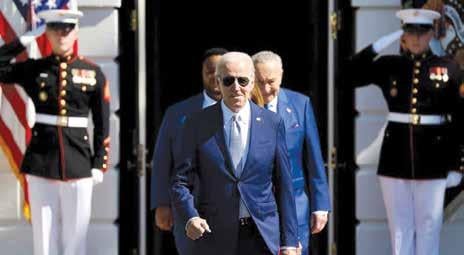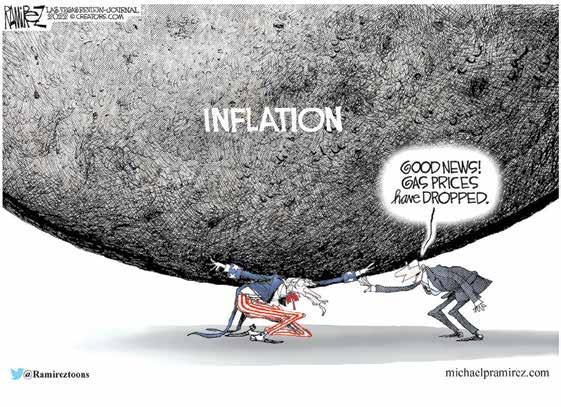
7 minute read
Connecting the Great Shofar by Rav Moshe Weinberger
From the Fire Parshas Nitzavim Connecting the Great Shofar with the Small Shofar
By Rav Moshe Weinberger Adapted for publication by Binyomin Wolf
In Parshas Nitzavim (Devarim 29:11), the pasuk says that Moshe, on the last day of his life, brought the entire Jewish people together “that you may enter into the covenant and oath…” Why was this necessary? In last week’s parsha, Ki Savo, Moshe had already gathered everyone together to induct them into a covenant (ibid. 28:69): “These are the words of the covenant…” What is the purpose of these two covenants?
Separately, how are these two covenants related to Rosh Hashana? Parshas Nitzavim is always read before Rosh Hashana. The Gemara (Megillah 31b) explains why the blessings and curses of Parshas Ki Savo are read before Rosh Hashana – to ensure that one year’s curses are finished before beginning a new year. But it does not explain why Parshas Nitzavim, which comes after Ki Savo, is also read before Rosh Hashana. Rabbeinu Nissim Gaon, zt”l, and others therefore ask why Chazal instituted that Nitzavim is read before Rosh Hashana. How does it help us prepare for Rosh Hashana?
One of my rebbes, Rav Yoshe Ber Soloveitchik, zt”l, explains in his sefer Al HaTeshuvah – On Repentance that there are two levels to the holiness of the Jewish people: the sanctity of the individual and the sanctity of the nation. Parshas Ki Savo, with all of its particular blessings and curses, contains the covenant between Hashem and the individual Jew. But Nitzavim contains Hashem’s covenant with the Jewish people as a nation – “in order to establish you today to Him as a nation…” (Devarim 29:12).
Rashi explains Moshe’s words of consolation following the curses of last week’s parsha: “Because Hashem has spoken to you and sworn to your fathers not to exchange their children for another nation, He therefore binds you with these oaths…” To strengthen this irreplaceable connection with the Jewish people, Moshe gathered everyone together, even the babies. The Ramban (on ibid. 10) explains this: “And he mentions even the babies… to bring them into the covenant because the covenant was even being entered into with the future generations…” Because the covenant of Parshas Nitzavim was with the entire nation, not simply all of the individual Jews of the time, it was possible to bind even generations which had not yet been born.
We can now understand the nature of Moshe’s comfort of the Jewish people based on Rashi’s explanation (on ibid. 12): “When the Jewish people heard the [ninety-eight] curses [in Parshas Ki Savo]… their faces turned white and they said, ‘Who can possibly endure these?’ Moshe [therefore] began to appease them.” But how did he comfort them? He did not remove those serious and difficult curses. But based on what we have said, we now understand that he was comforting them as a People, as a nation. He was telling them that with all of the individual suffering that Jews might endure, Hashem’s covenant with the Jewish people as a nation would be eternal. He said, according to Rashi (ibid.), “You have angered the Omnipresent many times, but He did not destroy you, and indeed, you still stand before Him… Just as the day exists [even though] it becomes dark, it shines again. So too, G-d has made light for you, and He will make light for you again in the future.”
Because of this eternal national covenant, Rav Soloveitchik writes (Al HaTeshuva, 132), “In connection with the holiness of the Avos, this sanctity passes by inheritance from Avraham and from Moshe. No sinning person has the power to destroy this vision. The covenant was given over to the totality of the Jewish people…and there is no power that cannot nullify it.” This was how Moshe comforted us after we heard all of the curses that would befall us. He was telling us that no matter what happens, Hashem would never sever His connection with us. We would always remain connected with Him, and no matter what happens, our light would shine again.
Based on this, we can also understand the beginning of next week’s parsha, Parshas Vayelech (Devarim 31:1): “And Moshe went and spoke all of these words to the entire Jewish people.” All of the commentaries ask: Where did Moshe go? What was the purpose of going to the Jewish people on that occasion? According to the Seforno, “He was inspired to comfort the Jewish people over his [impending] death.” How did he comfort them? He was telling them: In a short time, I will die. Everything I prayed for was to enter Eretz Yisroel. But Hashem did not answer my prayers. I am the head of the nation, its leader – ostensibly I might be considered the greatest Jew. But even I make mistakes, suffer setbacks, and endure suffering. Even I am punished for my sins. But I know that “the Eternity of the Jewish people will not die” (Shmuel I 15:29). An individual Jew may have his failings, but the Jewish people as a nation will make it to the end. They are eternal.
That is why these parshios are read before Rosh Hashana. When we are filled with a fear of “who will live and who will die” and everyone is consumed with his own circumstances and personal suffering, Hashem comforts us by causing us to hear Parshas Nitzavim, in which we are reminded that Hashem made an eternal covenant with us as a nation. We no longer look to our own personal salvation as our sole source of hope. Rather, we look to and live for our national vision, our people’s wondrous future. The covenant of Parshas Nitzavim between the Master of the World and His beloved, between Hashem and the Congregation of Israel, will never be abrogated.
In life, there is the “great shofar” mentioned in Shemonah Esrei, “Sound the great shofar of our liberation,” and there is the “small shofar.” Indeed, if there is a great shofar, it implies that there must also be a small shofar. Rav Kook explains (Igros Haraya II p. 326), “[During] the [shofar] blasts… one must contemplate the fact that the primary strength of the holiness of the Jewish people lies in the eternal world. The root of their holiness is there… This is the simple [shofar blast – tekiyah] before [the broken-sounding shevarim and teruah blasts]. But this power [of the nation’s holiness] must manifest itself in the character traits and in one’s actions [the shevarim-teruah of life]. From the root [the tekiyah], the personality traits and actions [the shevarim-teruah blasts] are rejuvenated.” The great shofar is our national existence.
And the small shofar is each Jew’s individual existence. Rav Kook is teaching us that the former must illuminate the latter. We must have both in order to be whole. The simple, deep sound of the tekiyah is our eternal national destiny. That is our great shofar, the holiness of the Jewish people as a nation. As the haftorah after Tisha B’Av says, “Nachamu, nachamu ami – be comforted, be comforted, my nation.” And as we say in Shemonah Esrei every day, “Return to Yerushalayim, Your city, with mercy” and “Sound the great shofar of our liberation.” We continually return to our national vision. But the Torah teaches us to join together our own individual small shofars, the details of our lives with all of our failings, difficulties, successes, and suffering, with the
great shofar of our national destiny, with all of its hope and promise. This is the greatest comfort.
Unfortunately, many Jewish people live with only one of these two shofars. Some Jews feel very connected to the wellbeing and future of the Jewish people. They follow the news, feel the pain of our people, and recognize that their destiny is bound up with the rest of the Jewish nation. But when it comes to the small shofars of their lives, they do not rectify those with the light of the great shofar. They do not keep Shabbos, eat kosher, or concern themselves with the details of halacha.
And there are other Jews who emphasize all of the fine points of halacha. They worry about their own parochial concerns and try to rectify their own personal religious lives. But they never concern themselves with the wellbeing, destiny, or future of the Jewish people as a whole.
The time has come to join together the covenants of Ki Savo with Nitzavim, the welfare of the individual with the welfare of the nation, the great shofar with the small shofar, and the sanctity of the part with the sanctity of the whole. May we merit to make this connection and thereby see the actualization here on earth of that which we say in Shemonah Esrei during Minchah on Shabbos, “You are one, and Your name is one, and who is like Your nation Israel, one nation in the land.”
Rav Moshe Weinberger, shlita, is the founding Morah d’Asrah of Congregation Aish Kodesh in Woodmere, NY, and serves as leader of the new mechina Emek HaMelech.











